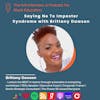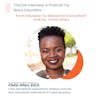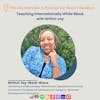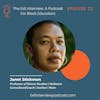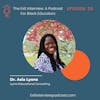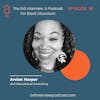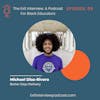
Episode 42: Revolutionizing Education for Our Children with Benita Gordon
This episode features a thoughtful dialogue with Benita Gordon, highlighting her personal journey from an inspired student to a passionate educator and leader. Benita shares her experiences in teaching, the influence of family and community in her career, and her perspectives on supporting and retaining Black educators in today's educational landscapes. Through her story, listeners gain invaluable insights into the importance of representation, the power of mentorship, and the need for systemic change to uplift and retain Black teachers.

Join us in this insightful episode of 'The Exit Interview' as we welcome Benita Gordon, a passionate educational advocate. In a candid discussion with Dr. Asia, Benita shares her journey from considering a career outside of education to embracing her calling as a teacher influenced by her family's legacy in teaching and the transformational impact of Black educators. Explored through her experiences and initiatives, this episode delves into the challenges and triumphs of Black educators, the importance of mentorship, and the creation of supportive and inclusive educational environments. Benita also discusses her involvement in innovative educational projects and the power of community support in shaping the future of education. Tune in to be inspired by Benita's dedication to making a difference in the lives of students and educators alike.
First of all.... have you signed up for our newsletter, Black Educators, Be Well? Why wait?
Amidst all the conversations about recruiting Black educators, where are the discussions about retention? The Exit Interview podcast was created to elevate the stories of Black educators who have been pushed out of the classroom and central office while experiencing racism-related stress and racial battle fatigue.
The Exit Interview Podcast is for current and former Black educators. It is also for school districts, teachers' unions, families, and others interested in better understanding the challenges of retaining Black people in education.
Please enjoy the episode.
Peace out,
Dr. Asia Lyons and Kevin Adams
[00:00:00] Seeing that and just matriculating through, I had amazing teachers, especially the Black teachers. And so in return, when I went into education, I said, Oh, I need to give back because they, that's what I got. I have to be like those teachers. I have to be like my mom. I have to be like the women and the men in my family.
And so when I'm teaching kids that look like me, then I'm being mentored by teachers that look like me in order to serve communities that look like me, it's essential.
Welcome to The Exit Interview, a podcast for Black educators, where we, Dr. Asia and Kev, delve into the crucial, but often overlooked, conversations surrounding the retention of black educators. While the spotlight shines in recruiting efforts, we turn our focus to the stories of those who've left the field of teaching.
The exit interview aims to spark dialogue among school district administrators, school unions, families, educators, and [00:01:00] anyone else passionate about fostering a more inclusive and supportive educational environment. Join us as we elevate these narratives, shedding light on the issues. on the challenges faced by Black educators and provide invaluable insights for the future of education.
Welcome to The Exit Interview.
Welcome back to another episode of The Exit Interview, a podcast for Black educators with me, Asia Lyons, here with another fire guest, always the best guest on our podcast. Today we're with Benita Gordon. We reached out to each other on LinkedIn. And I was just saying, before we got started, I think we put this time in the calendar.
Could have been like two, three months ago. Cause she busy, busy, busy. And so she's finally on the episode and we're just really excited to have you. Thank you for being on our show. Thank you for having me. Yes. We booked this two months ago. That's how you know people are busy and booked. I was like, yeah, on here, definitely wanted to come [00:02:00] on the exit interview specifically because it's a podcast for Black educators.
And that is me. Yeah. Yeah, well, I mean, we're going to just go ahead and jump right in because I love all the details and I love to chit chat. And of course, our guests want to know everything. So let's go ahead and get started. Tell us about your. Decision to go into education, what was that like? What was your story like?
Where did you teach or what did you do in education? We want to know all the things. Let me tell you something. I would love to say, Hey, I grew up and I was teaching to my teddy bears. And, but that's not my story. I come from a lineage of educators, which mom was the Greensville County public schools in Virginia.
My grandparents. aunts and uncles, cousins were all in education, friends, parents, and I was like, I don't want to be poor. Like, I don't want to, that's not the income I want. And so I was a nursing major. I applied to Old Dominion University, Hampton University, Norfolk [00:03:00] State University, HBCUs is where we attended for undergrad.
As a nursing major, did not want to teach, got into Hampton University, the best HBCU there is. I won't debate it. I'll debate your mama. And, right. I'll debate her. And did pre college versus a summer program, went back freshman year, woke up one morning, first semester freshman year, and walked to the registrar's office.
I don't even know if I had taken two weeks of classes. And you know, you're not even in real nursing classes, you're like taking that pre, you're And change my major to early childhood education, elementary. Wait, wait, wait, wait, wait. You can't, you can't just leave us like, you gotta back up a little bit.
What happened to them two? I've had folks. There's no other answer, but I literally, I woke up. It was like, I need to go to the red stars. I filled out my paperwork. And was being obedient the, you know, sometimes when you're young, you're obedient to the Lord. [00:04:00] And called my mom and dad and was like, Hey, just wanted to let you know I changed my major from nursing to elementary ed.
Well, cause I was going to do early childhood and I was like, no, that's little. Let me do elementary, because that's my mom, first grade, my godmother, my aunts, uncles, all were in elementary. And I said, I can do that. I love that. And the response my mom and dad was, thank God. Oh, wow. Okay. It makes sense though.
Family generations, yes. And literally, they both were like, Bonita, we did not understand this nursing thing. Like, we don't, you know, we don't, we don't know where it came from. My mom was like, you're a nurturer, yes. And so she was like, I'm glad you stopped fighting. And I didn't look back. Went on into my education department, into my English.
I was an English ed major and loved every aspect of it. Every aspect of it. Wow. I love that. So I am a rarity. I did not do student teaching. Shout out to Hampton University for making me change my major. So I ended up graduating with an English degree. [00:05:00] They would not let me take these two classes concurrently.
That's fine. That's okay. So I had to last minute go back and redo my senior graduation application to be English, English only. Thank you to my advisor, who stayed up with me all night to get it done. And graduated with an English degree. I want to take a couple of classes at Norfolk State. People think they're our rival and they are.
But we also take classes there because HBCU support other HBCUs. And took, this is how old I am, wasn't even a practice, it was the National Teacher's Exam, the NTE. That's alright, we gotta start somewhere. Yes, the NTE. Yes, with age comes wisdom. Yes, and then I started, was looking for a job, because what happens is, I didn't do student teaching.
And so they kind of looked at me funny, and I was like, well, how did, and I said, I have an English degree, but here are my scores, I passed everything for the national teacher's exam. And they were like, okay, and went to my little country area from Lawrenceville, Virginia, Brunswick County, and [00:06:00] next door to us is Sussex County.
And I went and I applied for a position. Got an interview and it was so funny because I'm signing my letter of intent to work and the superintendent walks by. He's passed now, but he was my best friend's dad's best friend. I went to Elizabeth City State together. So I knew him only by his nickname. So he walked by and I was like, hey, butch.
And he was like, Hey! He gave me a hug, spoke to him a little bit, he kept on walking. So now everybody in the office is like, who is this woman? Mmm. And the secretary, she kept looking at me, she said, I know you. And I was like, no, I'm, you know, I'm from Brunswick, I went to him. I knew that these people knew me, but I wasn't going to let them know who I was yet.
And signed my letter, got all my paperwork, all the things, W 2. I'm ready, because I came ready to get a job. I have all my paperwork with me. So security, I'm ready. When I walk out, I need to be signed on the dotted line. And this woman comes out of the back from HR. Licks me in my face. She said, Oh, you're Brenda's daughter and Mary Pete, my grandmother's nickname.
She said, Oh, you're Mary Pete's granddaughter. [00:07:00] And the other lady was like, Oh my God, I knew I knew you. She gave it away for you. You coming from the back of this, I've been here like three hours holding it down. And everyone in the office started loving on me and hugging me. And long story short is my mother went to St.
Paul's College at HBCU Lawrenceville that has since closed. But her first teaching job was in Sussex County. And they actually were assigning me the school where my mom first started teaching. Oh, wow. And I wasn't, I didn't say anything. And I said, Oh, I want to teach kindergarten. And I'll never forget the lady.
She was assistant superintendent at the time. She said, I am so sorry. She said, but we do not give first year teachers kindergarten or first grade. You can have second or third grade. And I said, why was that? Well, I'm a first year teacher. You're not ready. You're not ready for kindergarten, baby. You're not ready for first.
Oh, because you're doing the building foundation. Interesting. I'm not. I'm ready. I wasn't ready. Good. I wasn't. Can we pause on that? Yes. Because I've [00:08:00] never heard of that in my life. And I totally agree. Yeah. Now that you're saying it, I've heard that folks. will not put first years or first years in third grade because of testing.
But I had never heard of not putting folks in kindergarten and first because the students in the building blocks, which it makes sense. Yes. And I wonder because we have such a shortage of educators now, if folks are as selective, like as picky with that or how that still looks. But I love that they said that, that makes so much sense.
Said it and hurt my little feelings, girl, because my mom went to a first grade. Yeah. But I was okay. And so back then, this, and I'm, I tell people I started teaching in the 1900s, testing didn't come until two years later for third grade. So I was able to teach third grade. I did not end up at the school where my mother taught because I was still living in Hampton, Virginia.
And I was driving an hour to Sussex for work. Oh, I they had put me in a school, my mom told me, and it was on the other side of the county. And I was [00:09:00] like, I will have to move back home. And that is enough for me. Yeah. So, here I am, a first year teacher, broke, excited, elated that I'm teaching rural kids like I was, I am.
And the community came and wrapped their arms around me. So when I tell people that as an apartment chair, as a seasoned teacher, I buy extra stuff and put it in the teacher's lounge or pre service week, I tell all of the new teachers, Hey, there's a table in my room. Anything on the table is yours. Come get it.
And then she's like, that's brand new stuff, girl. And it's a mole I got in the closet. I'm going to pull it out. Cause. I'm not using it and you don't need to spend 500 right now. Yes, yes. Because my mom, my Aunt Jerry, my Aunt Karen, some of my mom's sorority sisters, some of the women who raised me, they came and donated and decorated my classroom.
Because, you know, we in pre service. Yeah. And I had no money. Yeah. You know, [00:10:00] and I'm that old where they paid you once a month, ma'am. Oh, trust me. I left teaching in 2018 and they were still paying us on the 20th of every month. I was hurting. Look, people, don't talk to me about survival because the educators know about survival.
Mm hmm. And so that's how I started and I started in third grade. and loved it. I'll never forget my first observation. I'm a good teacher. I'm good. I got to know this. It's in me. Um, it's in my heart. I've been realized my mom. So you realize you kind of were teaching all your life, but you didn't think about, you didn't think you were vacation Bible school, like just little pieces here and there.
And I'll never forget my first observation. Oh, I wish I could remember that assistant superintendent's name right now. She was a black woman, and that's important too, but I'm going to come back to that. And her two things she wanted me to work on was one, speaking to fans. She's like, and I know we understand each other because we're all from rural Virginia.
She said, but slow it down a little bit. Because she said, you won't always teach. You'll become leadership. [00:11:00] Ain't need to be able to present to anybody anywhere. And I said, yes, ma'am. And then she said, and you're not teaching gifted kids, you're teaching over their head, break it down a little bit more. And I said, wow.
And the women in that community and the women in that school, let me observe them. And they came and taught me how to break it down. They taught me how to make it engaging. They taught me how to think outside the box. And then the special ed teachers in the building came and said, okay, and then we're going to give you some strategies to teach the students that are in your classroom who have an IEP.
And that's the most important thing for me was I was in a school where they were like, we're not going to let you fail. We got you. And they stuck it around me and they made sure that I was great and they corrected me in love. And that was important. The way that you describe this, your experience and your, I don't, we'll get into like the later years, but let's just say in this moment that you're describing.
It's such a dream for so many teachers, right? To have folks coming in and decorating the room, folks coming and saying, I want to support you and just feeling held [00:12:00] where you're figuring it all out. Very welcoming space. And I love that. I think we've had quite a few folks who in their first couple of years of teaching have had that experience, but I do wish it was more.
But we've had some folks on there. And I tell people, I taught in a school district here in Colorado for a long time and my first school was Sunrise Elementary School in Cherry Creek Schools District and I loved and still do love Sunrise Elementary for the exact same reason that you described the way you felt about your first school and that folks were just so willing to support.
And there was no gatekeeping, there was no, oh, God, right, folks genuinely wanted to see the students succeed. Our school was very diverse in idea, racially, ethnically, and it was just a great place to be. And, you know, I've been away from Sunrise, I left in 2012, but I just felt so grateful that that was my first six years of [00:13:00] teaching was at a school that was so loving and so great.
And I never would regret. My time at Sunrise. So I'm so glad to hear that you've had that same experience at the school where you were. Thank you, Sussex County, Virginia. They have since closed the building because, you know, we, it's kind of progressed. Um, it was Annie B. Jackson Elementary School. I'll never forget because I could go down the street to the corner store and get some gizzards.
Oh Lord. Okay. It was so catchy. Look, y'all. And every once in a while I need, I was like, I need some gizzards. And I would run down and get some gizzards and fries and come back for lunch. And you were speaking about diversity. I did not have that. So where I am from, you are Black, American, or you are white American.
Even across the religious lines, it was not diverse at all. We may have had a couple of Jewish students, but you were either Christian, Protestant, Catholic, or you, nothing, like it was okay, like, we didn't, it was okay, we didn't [00:14:00] matter what you were, but you, those were the categories, and so it wasn't until I left, I stayed there two years, and then I went to Newport News, Virginia.
Diversity did not change, but going from rural to inner city changed. Oh, sure. So, I had to get some tough skills. So, like, teaching in rural Virginia, you can call a parent about a behavior. That parent will come during his or her lunchtime. That parent will, you know, come to the school. The parent would take that child home for lunch, and we understood what that meant.
They come back. So it was very much, Oh, no, no, no, we not gonna act out in school. No, this is what Miss Gordon said. This is what's happening. And I'm like, Hey, you know, just sometimes it'll be just like, Hey, you know, is everything okay? Cause then all of a sudden today is something different. They'll be like, Oh, you know, grandma is sick.
And I'm like, Oh, okay. Okay. Just little things like that. And so when I transitioned to inner city, there were some things I was, I didn't know. Cause I'm from rural Virginia. Even though I'm an adult, I was like, [00:15:00] what? What's happening? Oh, totally different. Totally, totally different geography. Yeah, there was another curveball.
So I, once again, let me tell you something that's about mentoring. I had an amazing mentor and my aunt also worked at that school. So I had two amazing, one official, but she's officially been my mentor all my life. Aunt Karen. Um, but then I also had a school district wide mentor. We actually had to meet.
We had like a little booklet that we were doing and going through. And that was essential because I was going from elementary, also transitioning to middle school. And so I went from third grade to seventh grade. Ooh. So we wouldn't know all about it. This is a great debate about middle school. Yes. When I taught sixth grade, loved it.
But I would never teach seventh. And I'm the exact opposite. And folks know where they fit in, right? So, yeah, who wouldn't hear about that part? Sixth graders need to be back in the elementary school. You not ready. Don't come up here. You still talking. That's why I love them. [00:16:00] Because they're big fifth graders.
Go back there. Stay over there. Give me my seventh graders. Let me tell you, the grade I love is seventh grade. They wide open. Wild up. Don't know left from right. Day to night. We'll cuss you out. Hormones. Everything. Musty. Cuss you out and ask you for a pencil at the same time. And some chips. Okay. Want a hug, then don't want you to just back up off of me.
Okay, whatever. Yes. And so all of that crazy comes with your crazy. We are all in this class on crazy and learning. Yeah. And I found, I loved third grade, but when I got to middle school, I said, these are my people. I am home. Thank you. And it was my aunt. I went to a, um, a, what do you call it when they do like when they do the whole day for the district and they wanted to teach us to come and we have our resumes.
We do these interviews on the spot. Oh, uh, like a job job fair. I went to the job fair. My aunt has to, you know, and I was like, Two years of driving an hour. I'm tired. I was like, I [00:17:00] can't do this. I was a newlywed. My husband was like, you need to, we finished with that. Find a job closer to home. Okay. Did this interview.
And I tell people the story. I said, I'm a Christian and I believe in the Lord guiding you and directing you. And when I say I was broke at this job fair, I had like five dollars and some change and I got lunch, you know, people left for lunch. Yeah, I got a soda and some chips out of the vending machine. I was just sitting there because, you know, there's no laptops.
We don't, our cell phones not like they are now. So you just sit there and I'm watching people and I'll never forget this principal that I interviewed with that. I thought I did a horrible job. Walked up to me. He said, I've been looking for you. I said, you looking for me? He was like, yeah. Yeah. Follow me.
And you know, at job fairs, you get to the second room. So the second room is the room they offer you the job. Get there, fill out the paperwork. And then I leave the job fair because I've done all of these interviews that I wanted. And I leave the job fair, and I [00:18:00] interview for middle school in my aunt's school.
So she called me, she said, did you interview for my school? And I said, yes, ma'am. She said, well, the principal really wants you, but did you sign with the elementary school? I said, oh, yeah, yeah, I signed with elementary school. She said, no. Oh, wow. She said, no, throw that in the trash, erase it. It's out of my hands because now that's on the district.
So my principal of the middle school went. And cause somebody in HR was like, snatch her, snatch that application and her letter. Oh, wow. And send it to me, like I'm going to offer her position here. So that was done all behind the scenes. I didn't find out about that till like two weeks later. When the principal at elementary school called was like, I dunno what happened, but it says you're gonna such and such middle school.
And I said, yeah, yeah. I dunno what happened either, but that's the paperwork I get outta . You dunno what happened. Okay. I was like, I have nothing to with that. He was like, oh my god. But my principal had seniority in the district, so they went ahead and was like, here you go, . And I was still friends with [00:19:00] that elementary school teacher.
Every year he'd be like, you ready to tell hell no. I'm home. . Yeah. I have made it to Kansas. But that's what I think that's the most important thing about being the edge. When I look back, one, it was about teaching kids that look like me. That was important to me. I need you to see what I saw growing up in Lawrenceville.
I had teachers, I had a majority of Black teachers. So when people say, Oh, when did you get your first Black teacher? They're like, high school, kindergarten, Miss Marks, daycare, Miss Packer on the van. So I'm too old. They didn't have pre K and Head Start, but we had our own community pre K and Head Start.
Yeah. Yeah, exactly. Yeah. Miss Jackson was my Head Start teacher. And I was like four, three. And so we knew how to read going into kindergarten. Like we, we, we over here, we knew all of the things. Yes. And so. Seeing that and just matriculating through, I had amazing teachers, especially the Black teachers. And so, in return, when I went [00:20:00] into education, I said, Oh, I need to give back because they, that's what I got.
I have to be like those teachers. I have to be like my mom. I have to be like the women and the men in my family. And so when I'm teaching kids that look like me, then I'm being mentored by teachers that look like me in order to serve communities that look like me. It's essential. It's, it's important.
It's important for my students to see me with my hair braided and my hair permed and my hair locked and my hair natural and me having no makeup or no makeup or glasses. Like it was important and I'll never forget. I'm a Hampton University graduate. I love it. I was petite at the time. We go, you know, Black teachers back then, you had to dress up to come to work.
I don't know, uh, Jean Day, where was that? We don't know nothing about that. Jean Day is teacher planning day, when the kids don't come. But we dressed up to come to work. So my students always saw me in heels, and I put my flip flops on in the classroom to teach, and then I put my heels on to take them to lunch.
And [00:21:00] I had long nails, and now I'm looking at these third graders, and I'm looking at my seventh graders, and now my girls are getting their nails done. What? And one mom, she's like, my daughter wants to get her nails done like you. I said, well, these are actually my nails, they just have an overlay. She's like, but, this, she's like, I, she's never wanted to be anything girly.
She's like, but no, Miss Gordon says, you know, you need to put lotion on your face. And wow, your lips chapped. You need to drink more water. And I'm just saying this in class. Like, that's my, Why are you coming for these ashy kids? Because you're not going to be ashy. I'm dark skinned. You should have lotion everywhere.
And I set up a station for them. Here's lotion. Here's, I'll have the fragrant and the non fragrant because my boys are like, we don't want to smell like at you. Um, if you need deodorant, I have a little deodorant. I have like a whole little kit. If you need sanitary napkins, there's some. You just grab what you need because there's none.
You need it and we'll have time to argue. We'll have time to go to the nurse across the school building. Let's go. Here go bobby pins. I love that. Oh, I love that. What you need, because that is [00:22:00] my kindergarten teacher, Ms. Winn. I'll never forget Ms. Winn, and we did my hair. Because our mom was out of town at UVA in grad school and our dad was doing the best he could because my daddy is the daddy.
He's one of the best dads ever. And my sister was a little older, so she was already doing her own hair. And my mom had already told my kindergarten teacher, I'm going to be out of town. You may have to redo Bonita's hair. She's going to let you know when she get here. And I walked in and I said, Ms.
Williams, this is my daddy did the best he could. She said, okay. So your mom had already told me. So this is what, this is the community I grew up in. Okay. Yeah. And Ms. Williams sat there and redid my ponytails. I, so I can function. I love that. Because I can't, I was like, I can't be looking crazy. Like what is, I can't read.
I can't read like this. . Yeah. I think when your students feel good, when you feel good, everything just flows better. Everything when you're full, when you're lotioned up, when girl, when you down, come on. Minute. Yeah. So you mentioned third grade and seventh grade, but then [00:23:00] a while back you talked about being in a position of leadership.
Yes. So tell us a little bit about that too. So I got to Lord, I think I was in my second or third year. So my fifth year altogether, I'm going into my sixth year. I was still teaching middle school in Newport News and became a team lead. I was like, I don't know what I'm doing. So I was like, let me figure out.
So I grew up understanding Robert's rules. Because I'm a church girl. And so I was like, okay. And was I in a sorority? I was in a sorority, but I also knew Robert's Rules. And so I decided to run my team meetings using Robert's Rules, but also start on time to end on time. And if the agenda is open, then the meeting is open.
But we're not going to meet without an agenda. And if there's no reason for us to meet, then we don't meet. That's it. Yeah, makes sense. Listen up, folks in the audience. Did you hear that? Just send an email. It's canceled for today. Like, hey, or I will do these things called [00:24:00] huddles. We will meet at the end of the hall for five minutes in a circle.
And say, hey, do you, everybody read your emails? You know, we have such and such coming down the pipe. There's a date on the email. Any problems with a parent or issue of concerns? Send me an email. If you're tired of talking to them, I will go talk to them. And thank you. In Jesus name. Amen. Look, teachers and preachers are the worst audiences.
We know this. And if you have me in a PD or you have me in a meeting that could have been an email, or you have me in a PD, somebody talking about something that has nothing to do with the children in my classroom right now, I am made. And you are wasting my time. So I don't believe in wasting a teacher's time because it is precious to them.
Yeah, I love it. And I'm like, okay, thank you. And if you, my door is open. If you want to come in and have a one on one, go. And as I went up in leadership, I had great leaders. So I had amazing assistant principals. I had amazing principals who were like, we see the leadership in you. We're going to give you the leadership role, but we're also going to [00:25:00] help you in that leadership role.
So you and I are going to meet and then you go forth and be a leader. And then I'm going to watch you from back here. I love that. And that's, so how long? That's the essential. Oh, go ahead. No, I was just saying, that's, like, that's the essential because we talk about gatekeeping. It's so crazy because I didn't, I'm going to be so honest with you, but 25 years in, my last five years are the first time I started saying gatekeeping.
One, I think it's my personality. I'm a maverick. I don't know who you're talking to. I don't know what you're talking about. You're talking to me crazy. You done got the wrong one. That. Okay. And two, my parents raised us that no, when you're working, just because that person said no doesn't mean no for the whole thing.
Who would they tell you no? Like they might just be no for that part. What's another part? Yeah. And so that's how I've always been as an educator, like, um, so you want us to read books. [00:26:00] And on my teacher thing, it says suggested titles. But all of these titles don't have any minority characters in it. So I had to find something else because we can't relate.
25 years is a long time. And that's, first of all, that's fantastic. Thank you. And I don't think we've had a person who's taught over 15 years on our podcast. I don't believe, I don't want to say for a fact. And so I've just learned recently that we're now calling master teachers around five years. And that's typically when people leave teaching is five years.
I really struggled to understand that because back to Sunrise Elementary, All the folks who supported me had been in there 15, 20 by the time I got there. And when I left to go teach middle, they were still there. So this idea of, you know, five years, six years is obvious. It's more common [00:27:00] now than it would have been in, like you said, the 90s or the early 2000s.
So you're not in the traditional sense of teaching anymore. How did you know it was time for you to shift from teaching Being in a public school sector in a way of this traditional education space into doing something new. I think it was little, it's like, I was told somebody said it's like, it's the two kids that are in the forest and they go to the witch's house and they meet a breadcrumbs.
Oh, Hansel and Gretel. It was like a Hansel and Gretel. Like the Lord was leaving and meet little breadcrumbs. It's like, hey, go speak at this place. Hey, start this podcast. Hey, start this business. Hey, become fluent and understand the class of management. Hey, start training teachers. So it was like little breadcrumbs, little pieces of leadership I was getting here, little fellowships I was doing.
And then I was also observing. I can't teach the way I wanted to teach. So the way I started teaching in 1998 [00:28:00] and the way I had to teach in 2008. Wait a minute. Wait a minute now. Because what are you talking, who are you talking to? Like, this, this, even what you're asking me to teach and the time frame you're asking me to teach it to the students that you're giving me to teach, makes no sense.
And I was a turnaround specialist. I'm in Title I schools, the majority of my students. 85 percent of my students are reading at two or three grade levels behind. What are you talking about? And then you trying to come in here and tie my hands on how I need to teach. So all of those little breadcrumbs, but the Lord was like, Hey, and I was like, no, and I'm fighting it.
No, I know where my check come in and my insurance pay. I'm trying to retire, Jesus. And he's like, okay. And then I went to a school because I'm a turnaround specialist. So my resume looks like I can't keep a job. And I was also a military spouse. But if you go into a school to turn around, if you can't do it in three years, why are you there?
And so I stayed in school two to three years, [00:29:00] helped with the engagement, helped rearrange some things. And then I would go to another school. Did you do this as a principal? No, I was a teacher leader. Well, I would come in as a dean or I would come in as a department chair. So say you may have, but a lot of times what happens is they would say, Hey, we have a lot of TFA.
We have a lot of second career changes. We have a lot of brand new teachers. We have no teachers that have seniority. We have no mature teachers. We need you to come in. We need to hire you, be team lead, help the new teachers, mentor, guide, all things. So you're a teach, but you're also a department chair, or you're the dean, but you also need to teach a social studies class.
Oh, wow. Okay. Got it. And so I would take those positions and I would say doing that, and I always tell people, you, at one point, there's several things I think teachers need to do. One, you have to leave that school and go to a different school because you need to see how things are done a different way.
And two, you need to get some type of administrative. position, whether you're a [00:30:00] dean or a department chair, where you can see, you can have meetings with administration and see what they're under to understand why you're under this. Because then as a teacher leader, I'm the liaison between the administration and the teachers.
And I can say to the teachers, hey, look, this is what's coming down the pipes on the district from downtown, from the superintendent. So this is what our principal has to do. In return, this is what we have to do as educators. And some of this is voluntold, and some of this is, you know, You got to do it, period.
Yeah. And so those are the things that we have to go back and understand. Now, do we have to agree with it? No, but we also have to understand the politics of education and the business of education. And so that's what I would try and go back to my teachers and say, okay, so the politics and the business of education says that we have to do this, this, this, this, and this.
I've already started it, or actually I've already done it. I need you to review it. And so as a leader, a lot of times for my teachers, I would take the weight and handle it [00:31:00] because they're teaching, but I learned that from good leaders. And so now you're looking at, okay, but either you're in this leadership.
How do I have impact more students and impact more teachers with support? Well, now I have to step out of the circle. That's what led me to coming over and starting Global Education Concierge. I had to step out. So I have to come over here to the right and then say, okay, I can support this circle with all of these hands and support more teachers.
I can work with edifying teachers. I can have a contract with this group over here and come in and teach and support and organize and strategize and say, Hey, I can work with transitioning teachers. Are you really ready to quit or do you just need to take a break and not teach summer school? Or do you need to change districts or do you need to change schools?
Do you need to change grades? Yeah. So you're right ahead of me with questions. I'm going to ask you all about the work that you're doing and I know that our folks want to [00:32:00] hear more about it. But before we go there, you jumping ahead of me, I want to know, we're talking about a teacher shortage in general, black teacher shortage for sure.
And there's a lot of conversation around recruitment, recruitment, putting money towards recruitment on and on and on. But we don't hear a ton about retaining our black educators based on what you've seen over your 20 plus years in education and all these different spaces, right? What do you feel are some strategies that school districts unions, school principals, families, community can do to keep Black educators, not necessarily in the classroom only, but keep them supporting youth and supporting other teachers in school district.
Well, first of all, you have to acknowledge that we're here. Hey, hey, hello. Your Black educators are here. And we are not the same. We are not the same. We do not subscribe to the [00:33:00] same thing. We don't always, always believe in the same thing. But we are present, and that's the one thing that we do have in common.
When we show up, we are there. But then how are you treating us when we show up? Because I don't have to deal with your microaggressions at my job. I deal with that in my regular life. When I go to the grocery store, when I go shopping. So let's look at the biases that you have in the workplace. I am not a disciplinarian.
All Black females and males are not automatically disciplinarians. I just happen to be one, but everybody doesn't want the rough kids. There are teachers who are amazing Black educators, who are amazing gifted instructors, who are amazing vocational instructors, who are amazing deans, who are teachers who don't want to leave.
They have no desire to be in administration whatsoever. There are some who come in who that is their desire. It's our job to see that and focus on that and nurture that. It is our job as society to respect that. to respect the title of teacher. So we're, we have people leaving for a plethora [00:34:00] of reasons, but one of the reasons I see is the microaggressions at work.
You keep giving me the students who are struggling and as if that's a compliment. I'm gonna say it like that. And I cannot support my family. I can't support my family in this position, in this title, with this job. I have to go somewhere I can support my family. I'm pouring into other people's children.
And yes, I'm in a service industry. But I can't feed my kids in my own house. And let alone being a black male, I have a family. It is understood for me to be the provider. And not the sole provider, but sometimes you are the sole provider, whether you're male or female. I need to feed these children. These kids need shoes and pencils.
These kids have to go to camp. My kids, my family. And then if for some reason in education we forget that educators are humans. And most educators, 70, I think 70 percent of educators right now are parents. But for some reason now, all of a sudden, like, I'm looking at the [00:35:00] thing now. You want me to show proof that I went to the doctor?
I will not. Or if I'm staying home with my kid, now you need proof from the doctor that my kid was sick. Well, when you're speaking to the Black community, my kid is sick does not always equate going to the doctor. That part. It equates home remedies. That part. Yeah. It equates tea and herbs and collard green juice and, you know, all of these things that we do.
And ginger ale. And ginger ale. And saltine crackers, because that cures everything. And chicken noodle soup. Like, these are things that it doesn't equate. Financially, I can't get to the doctor. That's a copayment. And so, when we go back and pull the lens back, teachers are leaving for a plethora of reasons, but Let's talk about it because when I speak to teachers that are ready to leave, it's the microaggressions from the adults.
It's the safety. It's the safety. So you're scared and you're building? Okay, what are you talking about? It is the financial responsibility. So how do we stop that? Fix those things. [00:36:00] Fix it. I don't want to hear it. Like, don't talk to me. Fix those things. How are you having someone with a degree from a four year institution, plus credits, a master's plus credits, a PhD.
Plus credits, and you are excited that you just got the minimum wage for a teacher up to $45,000 in 2024. You want us to be excited? Woo. No. Mm-Hmm? . You better go sit down outta my face all the way outta my face. Go sit down. I'm in Miami. In Miami, the average first year teacher makes $48,000. In Miami, in a decent area to get an apartment is 2, 200 a month.
What are you talking about? Yeah. And when I say decent, I mean as a single, because I can only speak from my experience, as a single Black female, I don't feel scared to live here. Right, that part. Okay. And I have a car now, and I have car insurance, and I have rental [00:37:00] insurance. And I have student loan payments.
Oh, we girl, we didn't ignore that. We ain't got there yet. Student loan payment. What is that girl? That's so I'm broke, but I'm a professional. If I have a degree and I get consistent, continuing education, I am a professional. But I'm living paycheck to paycheck. So now I'm running Uber. I'm doing after school.
I'm doing dance. I'm doing cheer. I'm doing Saturday school, doing summer school. I started my own business. I'm making t shirts. I'm making cakes. I'm catering. What y'all talking about? Lashes, hair, all of everything. Car maintenance. Tutoring. Tutoring. I'm tutoring at the school and then I'm tutoring my own tutoring business on the weekend.
I'm a musician. I'm playing at all the churches. I'm playing in the clubs. I'm working at the club. I'm a bartender. I have several friends that are bartenders in D. C. Bouncers. Bouncers. And then if you have a family, you don't see them. You don't see them because you are trying to provide for them. And then you flip it.
We have parents who are aggressive and [00:38:00] aggressors and we don't protect our teachers. What you're not going to do is come up here and mess with my teachers. That's what you're not going to do. But I was in school districts and I was in schools that did not allow that. We believed in the village mentality.
How can we work together? The first time I talked to you is not the first time your child acts up. We believed in touch points before you got there. So now we're in a village mentality, but teachers are going to continue to leave. It doesn't matter what color they are. You can go on Facebook and Instagram and Twitter right now and LinkedIn.
Teachers are leaving in mass droves. There are three things we need to look at. If you are a school leader, you need to look at your school culture and climate. Let's talk about that. Anytime we have 20 teachers leaving a school building or something, it's wrong. And they not retiring. Three retired. You're talking about a transfer portal for MBA or MBA, you got to transfer a portal for teachers.
Everybody's leaving the school, but nobody's looking at the leadership. We have a problem, Houston. And so, teachers are going to continue to leave until you start respecting them as professional [00:39:00] educators. And until we change the systemic sexism and the systemic racism in there that's built in. And so, we are having a problem, but we told them that the problem was happening.
Nursing and teachers were declining. Universities and colleges, they're closing their school education because if kids not coming in, kids hated school, they're not going to turn around and be a teacher. And as you treated all of the Black male students horribly. And they said, we're all the Black male educators.
They doctors and lawyers and technicians and truck drivers because who, why would they come back to where you marginalized me? Yeah, that part. And so we're walking back into a space of trauma. Right. And so what do we do? We help heal the trauma. We change how we do. We address the biases. We teach the children where they are to get them where they need to be.
And we allow teachers to teach, get rid of the microaggression. I have met some great teachers that have been teaching for five years and they are me's. If they want to go into leadership, they should. They want to stay in a class and they should. [00:40:00] But don't tell me because every teacher that's been there five years is a guru.
They're not. On the flip, every teacher that's been there 30 years, they're still not good. You just hear. You just hear. Thank you for being present. You're not helping or harming the kids, so we appreciate you. And so we have to Just sitting there doing harm by being neutral. Being neutral. School has been neutral, and nothing is progressing.
And so, to keep Black teachers in the classroom, they have to feel needed, accepted, and we have to pay people. And I don't care what color you are. Pay people. Somebody said, what's your pronouns? Pay me. That's my pronoun. Pay me. Because I have teachers that are retiring and then getting another job. Not because they want to, they're coming back to the classroom because then they can do drop.
They can get more money because they didn't have enough to retire. They retired but didn't have enough and came back. So I'm sorry that was long winded. Oh, no, you're totally fine. You're totally fine. So when we get back, [00:41:00] I want you to definitely tell us about all the things that you're up to. My favorite part of the episode is always the second part and we'll be back after this commercial break.
Hey there beautiful people. It's me, Dr. Asia. Before we dive back into our conversation, Kevin and I have something exciting to share with you. Are you a dedicated Black educator or support Black educators? Well, if so, we've got some great news for you. We're thrilled to introduce the latest addition to our podcast community, the Black Educator Be Well Newsletter.
It's a space dedicated to all things Black educator healing, wellness, and more. We believe that taking care of our Black educators is crucial, and this newsletter is designed to do just that. Picture this, exclusive insights into self care practices tailored for Black educators, inspiring stories from fellow teachers who've overcome challenges, And tips for creating a positive and supportive environment at work and at home.
Subscribers will get early access to our upcoming podcast episodes, special interviews with guests, and even some surprise [00:42:00] giveaways. How do you become a part of this amazing community? It's easy. Go to xTheInterviewPodcast. com or check out the link in this episode's show notes. Now let's get back to the conversation.
All right, welcome back to the X The Interview Podcast for Black Educators. We're with Benita Gordon, dropping all the gems today. We're getting into the second part of the podcast, my favorite part, where we start out with my favorite question, perhaps, which is, is there a teacher, and I already know the answer to this question, but is there a teacher that you would like to shout out on the podcast?
Or for you, Are there, how many teachers would you like to shout out on the podcast? Go ahead, shout them out. That taught me or worked with me. Let's do that. Your choice. Oh my God. So I'm a shout out. Every teacher that was at Totara Elementary School, home of the Indians, because they were from Rio Virginia.
Leave us alone. That taught me. And my sister and my brother, because it was three of us. Teterra [00:43:00] Elementary School, Jane Solomon Russell Jr. High, and Brunswick Senior High School in Lawrenceville, Brunswick County. Shout out to all of them. Every one of them. The ones that kicked me out of class. Mr. Jones, who kicked me out because I stood on top of the science table because somebody dared me to touch the ceiling.
And he didn't yell or scream. He walked back in. I had touched the ceiling. My finger was literally on the tile. And he simply said, Benita, Nessa, Goddamn Nessa, you want me to go to the front office or you want me to go to guidance?
I love it. Like I, I accept it. Where you need me to go? Left or right? Because it's not even an argument. Shout out to my librarian and I can see her. I can see her sign because her sign was just Miss, oh my gosh, her sign is Whitney. Miss Robinson. My librarian, Miss Robinson. I was telling somebody the other day, I said, let me tell you something.
I didn't realize I was a nerd until I got to high school and I accepted it. I don't care. But I was [00:44:00] also an athlete because I was cheered. I played tennis. I was one of those nerdy, geeky, athletic girls. But I would stay a lot of time, now think about it. I spent a lot of time in the library. I spent a lot of time in the library.
And she would give me books to read. Maya Angelou, man. One in the Middle is the Green Kangaroo. And I realized now that she was giving me books that were about my personality. And about me being a middle child, about me being, well, I came out wild. I was born, my mom was a UK, nowhere girl, you was here, you came out, I came out screaming, you don't have to pop me, you don't have to do nothing, the doctor was like, she here.
And I now look back and she was giving me books about Black women, about women, about greatness, about speaking, about finding yourself in the middle of all of the things, about being different and unique. And I look back now and I'm like, Oh my God, like she set me up for success. Just being a librarian at the Terrell Elementary School.
We had a beautiful, we have a, I haven't been in a minute, but it was a beautiful library from back then in the 80s. Like top notch library. And yeah, every teacher that touched me, every [00:45:00] teacher that corrected me in line, because I was that child who had the desk beside the teacher's desk because I was wild.
Not because I was on it. You one of them. Uh huh, I wasn't misbehaved. Oh, you was one of them. I wasn't one of them. I didn't misbehave. I wasn't disrespectful, but I was just like, I'm finished my work. Let me go help these kids over here. She's like, no, man, one of those great student, but talks a lot. I can pull them out.
I'll pull out every report card, every report card. And even in high school, in college, my professors at Hampton university, Dr. Gilchrist, just being there and saying, Hey, this is what you're going to do. This is how you're going to do it. The women who. Initiated me into the Alpha Kappa Alpha Sorority Incorporated Gamma Lambda Omega Chapter on the campus of St.
Paul's College. Where women who were my teachers, who I looked up to, and I was like, well I'm about to be their sister. So all of that, shout out to all of them. My best friend's mom, Ms. Bland. [00:46:00] Oh my god, Ms. Owens. Mr. Thompson, some of these people have passed away, but my friends, their kids listen. Oh my goodness, Coach Dawson, Coach Red, Coach Red, I tried out for softball and Coach Red said, get off my field.
Oh, dang. Because I caught with my left hand and I went through with my left hand. Go, you can't do that. He was like, why are you out here? Chill your practice, chill your trials for next week. Yeah, go, come back in a week. And I did, and I made the squad. You got to have people to direct you. Um, my dance instructors, um, um, girl scouts, like all of those 4 H.
Mm hmm. So all of those teachers, because when you say teacher to me, that's outside of the community. Yeah, yeah, for sure. Just Vacation Bible School, Little Shallow Baptist Church, even a First Baptist down the street. Ooh, Miss Mark's Sisters. Oh my gosh, I can see them at Esa Rita. They ran the rec [00:47:00] program.
They ran a reading program at our Recreation Center. in the basement. So upstairs was like the pool and all of the things and we went down to this basement. It was still nice and clean and warm and cozy and they taught us how to read and how to speak. So when I tell you I was literally was raised in a village, I was raised in a village and it was safe.
And that's how I do my classroom. So my classroom was always my safe zone. And as a Black teacher, it was important for me to accept all of my students, especially in middle school. As a Christian teacher, it was important for me to love all of my students, which means I accept them. And so, I would always make my room a safe zone.
I'm always gonna have a cozy corner. I'm always turning lights down and have lamps. I'm always gonna try and make sure it smells good. I'm always gonna give them a moment to just breathe and be. I'm always going to say like one of the students, he said, you, I changed my name and I said, right. But I don't do nicknames.
He looked at me. He understood because I understood what he was saying to me, but I also want him to understand that this is a safe zone, [00:48:00] but I also, these are the rules. I don't do nicknames. And so you changing your name and it's not changed on paper, unfortunately I can't do that yet. And he was like, gotcha.
Okay. But see, how was it? He wasn't upset. I wasn't disrespecting him. It was just understood because it's a safe zone, but I have to follow the rules. And so. Yeah, shout out to all of them. It was a village because I was wild. I still am. And there it is, folks. And if y'all know me, y'all know like I was wild.
Like I hit that mom that was like, yeah, so life endeavors in the power of your tongue. I'm gonna need you to watch what you say in the phone because you'll say something and cut them. And I'll walk away because I'm like, dude, you needed to hear that. She's like, but everybody, everybody not built like you.
Yeah. And so being an education, I have to learn how to say thanks to colleagues and my students. I can't say politically correct because I still was probably wrong. But I was like, look, what we're not going to do or what we're going to do. But Colleen now, she was one of my [00:49:00] mentees and she was like, you would volun tell us.
I said, what? She was like, you will volunteer with us. She said, you will want us to lead a lesson, though. I always want them to lead the agenda. I don't have to be the lead every time. I do the agenda. You run the meeting. Everybody needs to learn how to run a meeting. And she was like, you will start off with a story, and then the next thing you know, you got us presenting at the conference next week.
Yeah, because that you need to present. You're good at this. You know how to do this. Especially with something about curriculum or, or data. No, we need to go out into the world and show the people we know what we're talking about. So, yeah. Shout out to all of you. And then I'm going to shout out my principals and assistant principals who I was under your leadership because I know who I am.
I know it was rough to lead and to follow, but you hung in there with me and I appreciate it. I love that. Okay, so now we get into the part. You've hinted about this. We got a podcast, a business, all the things. Tell us, what are you up to these days? I really need a nap. Oh, yes. [00:50:00] Listen. I need a nap. No, really, so.
I have always been a maverick. I love to revolutionize things. And so I started Global Education Concierge. I taught overseas, I lived overseas. Education is different in different countries and different cultures. So I wanted to understand what we were doing wrong in America. What do we need to fix? Bring in what other countries are doing.
And so I started the Education Concierge. That business is threefold. So we work with parents from the beginning to the end. So I had a parent reach out. They have a child that's autistic. They do not believe the school system in there currently is beneficial. They want to look at innovative education.
Okay, let's go. Oh, I have a teacher that's teaching, and I have several that reached out. Hey, I want to transition out of the class. Let's talk before you do all that, because I think, let's go through these steps. So I'll help them, engage with them from the beginning to the end. And then I'll have educational institutions.
So it might be a school, a school district, another micro school, a conference. They say, hey, Bonita, we know that you're [00:51:00] good, and this is your guru. This is your zonist genius. Can you come speak here? We're inviting you to come speak here. Can you do a proposal? Let's see if you're going to fit. And this conference.
And so that's what global education concierge is. We are a full service concierge about education. That's what we do. Love it. And then in the midst of that, as I was transitioning out, I said, Ooh, I need to start a school. Cause why not put something else on my plate? Um, so. We started during Covid, GGEC Academy was online, and then we have transitioned to Miami Micro Learn Hub, where we're a micro school for tweens and teens where we revolutionize education.
So we know the kids hate school, but we don't want 'em to hate learning. So we allow parents to transition them out of the traditional classroom into our non-traditional, innovative classroom setting. We have personalized learning. So we focus on entrepreneurship, project based learning, and we focus on the basis, the foundation of [00:52:00] education.
And we help build them up that way. And we will open in September. We might open a little sooner. I see some things working. But we open in September. And so let me be clear, because people sometimes get us confused. You pay for us. We are private school. You pay. Because we are our company. But I have parents who are excited about it.
It's tailored education. Our max full time is 25 students. That's it. No more. It's a whole class. But there'll be ages from 10 to 17, possibly an 18 year old will come in. We have one or two that we're looking at credit recovery. And then how do we get them into the community college atmosphere or progress into where they need to be?
They're missing some things and they don't want to drop out. So we're able to bring them in, allow them, give them time to finish and then help them matriculate to the next level. And then we do the podcast. The podcast came before everything. Um, because I like to talk. And I was tired of people telling me, I can't find any black educators, there's no [00:53:00] DVD, shush, shush.
But I found them on LinkedIn. And so we slide, like we did, we slide into people's LinkedIn professionally, because we talk about business. And I asked them, Hey, I've been trying, I track them and I vet them. I know that's what you did with me, track them and I vet them. And we say, Hey, do you want to come in and do a podcast session?
Hey, I've been looking at this. You're disrupting education this way because that's what you do on your podcast. The exit interview, you're disrupting education, but you're also giving people the information to disrupt, but also to rebuild. Yeah. And that's what I do. And I'm the middle child. I have an older sister who has three amazing nieces and nephews for me to help raise.
I have a younger brother who has one amazing niece that I helped raise. I have a brother in law that I've known since I was in seventh grade, and our dad is still alive, crazy. I am his child. Got it, honest. Yes, and I am single, so if we are [00:54:00] I am single and we're dating with purpose, so if you're not trying to holler at me for real, don't holler at me.
I'm here for that. I was previously married, and I got married young, and then that marriage ended. And so I'm single, and I love to travel, and we be out. My out in the streets is not like the young girls out in the streets. Like, I'm out in the streets at a conference, at a convention, networking, brunching.
Daytime events. Daytime events. Daytime events. I mean, we do some nighttime events, too, but that's, like, we're dating. Like, we're dating. We're not out here in these streets. And yeah, and I love it. I love social media. So, I'm one of those vintage, what do they call me? Are they vintage teachers? Vintage educators who feel that it's necessary for me to learn chat, GPT, and AI, and I need to understand how social media works, and I'm going to keep my ear to the ground with lingo and slang, and I love Glorilla, and I love Glory Glory Hallelujah.
Yeah, I love that. My playlist [00:55:00] looks crazy. Because you're going to hear some Kendrick Lamar and then you're going to hear Prince and then you're going to hear Mahalia Jackson and then you're going to hear some Sexy Red, like I'm going to listen to it all. Yes, I'm not bad. So wait, you going into my last question, which is what is bringing you joy these days.
So tell us what's bringing you joy. Let me tell y'all something that's bringing me joy. It's going to be so crazy. Pickleball. Okay. Wow. I have put on some pants because when you get older, you put on the pants and you be like, wait a minute. It takes a little longer to get them off. And so I realized the other day that, girl, you can't get in these jeans.
So I need to start working out. And, and let me tell you how I play with like old men, like these old Caribbean men. I love them. This is my crew. When I say old, they're like retired 60 plus. Sure, yeah. 55 plus. And I play pickleball and we joke and we laugh. I'm not ready to go to the next level yet because I need to be a little bit more consistent.
That has been bringing me joy. [00:56:00] Seeing my nieces and nephews become grown. I have a 24 year old, 19 year old, 18, coming up 17, and we're almost three. It'll be this year. Three will be away in college by the summer and then one is at the house and I am the joy in that. Like the pictures come up and auntie cries and prom and.
Just being present with them. The other day they were like, you know, you can, you know, you still can have a baby. I know. I didn't say I couldn't have a baby. You just, I don't, I really feel like it needs to be me and somebody else. Like a daddy. Yeah. Babysitting. That part. But my niece sends me this YouTube interview where the black woman, I remember her name right now, who adopted her son at like 48, 50 or something.
And she was like, auntie. And I said, okay, thank you. Um, that brings me joy because it's so funny to me that y'all are concerned about me when I'm concerned about you. Yeah, I love that. And then just [00:57:00] the friendship. And I have to say this because people think I'm some type of anomaly. I have amazing friends and I've had them for several years.
Mm hmm. Jamila, Annie, Tanya, Tamisha, Shalai, Heather. The list can go on. It's a tight circle. We do not talk all the time, but we will send each other a message like I'm praying or I thought, look at this picture, or I saw this article and thought about you. Or it can be something like, Hey, I know you got a lot going on.
Just let you know, I love you. And you got this. Friendship brings me joy in my, I can't say old age. I'm 47, but these lasting real friendships. Like I tell people my ride or dies. These were the women that when our moms and dads got sick that we came. When our moms and dads passed, they were right there after everybody left.
They were still there. Yeah, I love that. And so that brings me joy being a Black woman, being able to go on trips and Zoom calls, and having a loving [00:58:00] family, but also having loving friends. So I'll say the athletic part, the pickleball, watching my nieces and nephews become four and no more. I'm gonna shout y'all out.
K1, K3, there y'all go. Um, and my friendships, because they do give me like, they know. A sister friend can text you, all of us the strong friend, and we don't have any, all of us are the strong friend. As of being a strong friend, the other strong friends have to check on you, and they can be like, Hey, I was thinking about you this morning, you know, I don't know what's going on, and you really don't have to tell me until you're ready.
But I wanted you to know that I'm here, and I'm praying, and hit me up, and let me know you're good. That's it. And that is important. Yeah, well folks. That's a great way to wrap it up. This has been another fantastic episode of The Exe Interview and a podcast for Black educators. Bernita, thank you so much for coming on folks.
If you are interested in being on the podcast or you know someone, connect [00:59:00] us. We're on LinkedIn. Bernita already said that she's on LinkedIn. Find us so we can do that good work and we'll talk to y'all later. Bye. Bye.
Thank you for tuning in to another episode. We hope that you've gained valuable perspectives and a deeper understanding of the conversation surrounding Black Educator Retention. As we conclude this episode, we encourage you to join our Patreon to support our work. Plus, as a patron, you receive bonus episodes, merch giveaways, and much more.
Stay engaged with us on our social media, sign up for our newsletter in the show notes, take a look at our YouTube page, and interact with us on our website. Remember, the stories we've shared today are just the beginning, and your participation is vital for the future of [01:00:00] education.

Benita C Gordon
EducationConcierge/CEO/Founder/
Benita C. Gordon is a visionary in the field of education with over 24 years of experience. As a passionate turnaround specialist and advocate for progressive and disruptive education, she has dedicated her career to transforming educational systems. With a deeply ingrained belief that teaching is in her DNA, Benita has established herself as an edupreneur, founding Just Teach Education Consulting and Global Education Concierge BG, LLC. Through these platforms, she provides invaluable educational advising, coaching, consulting, and training services. As the Education Concierge, her mission is to streamline and coordinate all aspects of education, both nationally and internationally, removing obstacles and simplifying processes. Benita's impact extends beyond consultancy as she hosts The Education Concierge Podcast, featuring weekly episodes where a diverse range of guests engage in enlightening conversations about education. This empowering content can be accessed on all major podcast platforms. With her unwavering dedication to transforming education and providing holistic support, Benita C. Gordon is a leading figure reshaping the future of learning.
New to The Exit Interview: A Podcast for Black Educators?
Here are some great episodes to start with.


















